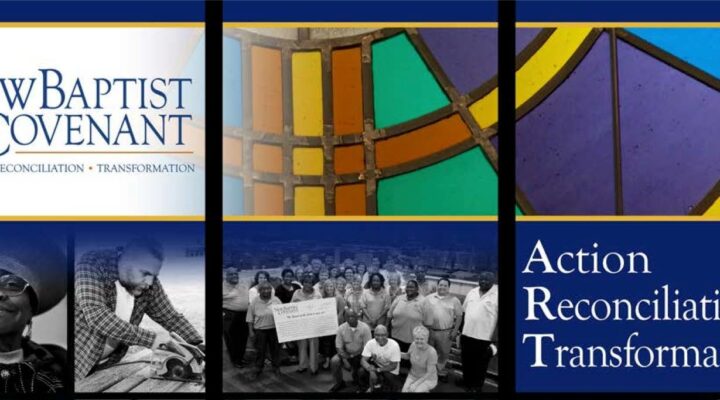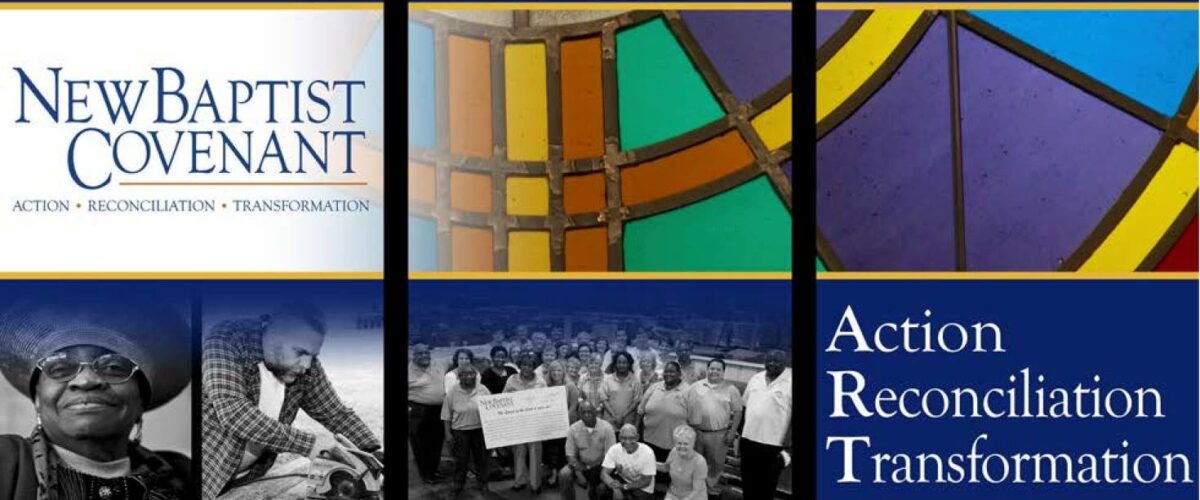A combination of COVID-19 and increased national conversations around race have prompted New Baptist Covenant to announce a change in strategy.
Launched in 2007 with impetus from former President Jimmy Carter, New Baptist Covenant sought to create a movement that would bring Black and white Baptist churches into conversation and, ultimately, into covenant agreements.
Many success stories have been reported in the years since, as Black and white congregations — typically in the same city — have gotten to know each other, have learned their shared histories and engaged in projects and trips together.
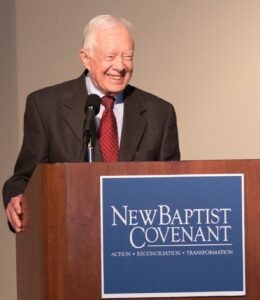
Jimmy Carter speaking at a New Baptist Covenant event.
Most notable among these success stories is the collaboration of the two First Baptist Churches of Macon, Ga., that share an intertwined history from the time of slavery but had sat silently across a parking lot from each other for decades. That story was chronicled in BNG coverage and in Robert P. Jones’ bestselling book, White Too Long.
In Dallas, Friendship-West Baptist Church and Wilshire Baptist Church created a covenant of action that led to multiple inter-church dialogues, an annual MLK Teach-In, and a shared Civil Rights history tour.
Similar stories could be told across the nation, but especially in the American South, where the movement began. Although in recent years, NBC has reached more congregations outside the South.
Yet the distance between 2007 and 2022 is greater than ever imagined, said Aidsand Wright-Riggins, NBC executive director, in a Feb. 21 interview with BNG.
A different moment
“COVID really took a toll on us because everybody went insular,” he said. “Our churches, our denominations began to suffer … we were socially distant from each other, and the New Baptist Covenant was talking about how to bridge those distances.”
In short, the organization as designed relied upon face-to-face dialogue, which became impossible during COVID.
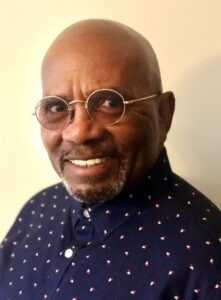
Aidsand Wright-Riggins
COVID also took away the bandwidth most churches have to tackle special initiatives as all the energy had to go to sheer survival. “Churches are trying to figure out how do we support auxiliary ministries when we’re struggling ourselves,” Wright-Riggins noted.
Likewise with the 30 denominational groups that are part of New Baptist Covenant, as their energies increasingly flowed to helping churches navigate the pandemic.
At the same time, a series of events in the nation raised the level of awareness and dialogue about racial issues so much that one of NBC’s major goals began happening more naturally. Especially since 2016, Americans have become more aware of the need to understand the nation’s legacy of slavery and Jim Crow laws and prejudice. Then the conversation got raised to an even higher level with the spring and summer of racial reckoning in 2020.
“The good news is that this was a wakeup call to churches everywhere,” Wright-Riggins said. “We have more churches now that are seriously talking about race and racial justice than we ever have. And denominations have developed more programs around race and racial justice than they ever had. Other groups like Baptist Joint Committee for Religious Liberty began to talk about these issues … others were beginning to do this kind of work.”
This natural conversation — painful and controversial though it may be — is exactly what New Baptist Covenant hoped to spark, although its leaders could not have foretold this series of events.
Understanding the sequence of events
When Carter called together leaders of 30 Baptist bodies in 2007, a holy moment sparked something those leaders hoped would become a long-lasting movement. At that time, George W. Bush was in the White House, the idea of a Black person becoming president seemed a distant dream, and Donald Trump was known only as a reality TV personality.
But at that time, among Baptist bodies there remained separation and even segregation. The predominantly white Southern Baptist Convention and the more-white Cooperative Baptist Fellowship were not in active conversation with any of the historic Black Baptist denominations.
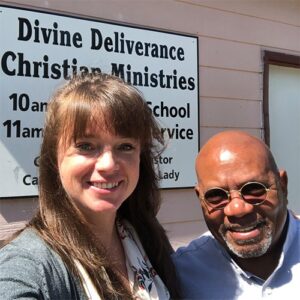
Hannah McMahan King (left) and Aidsand Wright-Riggins previously served as co-executive director of New Baptist Covenant.
As a product of the Deep South himself, Carter was frustrated by the lack of dialogue and collaboration, by how insular the SBC and other Baptist bodies were becoming, said Wright-Riggins. “He saw a moment where he could use what was happening in the SBC with its fracturing to begin to say, ‘How might we begin to reach out to more Baptists to become more of an inclusive fellowship?’ What would happen if we brought together Black Baptists and white Baptists for fellowship and addressing racial reconciliation?
This occurred at a time when the Black Baptist denominations “also were wrestling with becoming more collegial with each other,” he added. From this, the New Baptist Covenant was launched, “really bringing together churches across theological boundaries generally and racially, ethnically.”
The goal was to bring churches together to study Luke 4:18, where Jesus declares: “The Spirit of the Lord is on me, because he has anointed me to proclaim good news to the poor. He has sent me to proclaim freedom for the prisoners and recovery of sight for the blind, to set the oppressed free, to proclaim the year of the Lord’s favor.”
That dialogue would lead to action. And in many cases it did, but progress was slow.
“At the time, we thought this would be easy,” Wright-Riggins said. “We thought it would be easy and would take off with hundreds and hundreds of covenants of action. But it was not easy.”
Just a year later, as Obama was running for president, his Chicago pastor became a lightning rod for comments he had made previously about race. This became a focus of the religious right and of Obama’s political opponents.
“Right on the heels of the founding of NBC in 2007, we also began the deconstruction of a lot of racial goodwill in 2008 with the backlash to Jeremiah Wright being Barack Obama’s pastor,” Wright-Riggins explained. “What Jeremiah Wright had done was expose the underbelly of America’s racial past. Conservatives began to use that to undermine Obama and to make us more racially divided.”
New Baptist Covenant “began as a kumbaya moment, and then we learned this wasn’t going to be easy.”
New Baptist Covenant “began as a kumbaya moment, and then we learned this wasn’t going to be easy,” he continued. “The racial divides in this country were much deeper than they may have appeared on the surface. … We began to fracture even more religiously and politically.”
As a result, it “was difficult to get a mass of churches to say yes, we’ll create a covenant of action.”
“You can’t work with each other if you don’t know each other,” he continued. “Getting to know each other means coming face to face with some harsh realities in this country.”
At its peak, NBC engaged up to 150 congregations in covenants of action — good but nowhere near the lofty goals that has sparked the movement.
Then came the racial divisions of the Trump administration and the perils of COVID.
An organization that already was not meeting its financial aspirations initially benefitted from the increased awareness Trumpism created but then got slammed when COVID took the wind out of church and denominational finances.
“New Baptist Covenant as a movement has been wonderful, but as an organization it has seriously lacked the financial resources to make an impact,” Wright-Riggins said.
“New Baptist Covenant as a movement has been wonderful, but as an organization it has seriously lacked the financial resources to make an impact.”
A new iteration
All this led to a decision to make adjustments for the future, which Wright-Riggins addressed in an email last week to people who have supported the organization.
“Over the next several months, the New Baptist Covenant will be transforming its programing and transitioning its operations as it adjusts to COVID-19, missional challenges, and financial realities,” the email began. “It is no longer feasible for us to function at the staffing and resourcing levels that we had attained pre-pandemic. In the coming days, our focus will be to return to our founding DNA as a movement while traveling as lightly as possible as an institution.”
While the organization’s new approach is still being developed, one thing is clear, Wright-Riggins said in the email: “The missional objective of addressing racial justice has motivated denominations, churches and organizations to take on aspects of this work that they were not doing so before. Some do this collegially, if not collaboratively or in partnership, with New Baptist Covenant. We are encouraged that more and more, the work we wanted to see happening in 2007 is being done, even when we are not doing it together.”
In his interview with BNG, Wright-Riggins cited three priorities of New Baptist Covenant in the present moment: Convene, connect and communicate among the churches and organizations that offer resources.
“The good news from my perspective is that there are still people out there from a volunteer perspective who are happy to talk about it, happy to offer resources, that we’ll make happen,” he said. “These leaders are all committed to continuing to have these conversations with each other.”
Related articles:
Two Baptist churches use shared roots to grow covenant of action in Macon, Ga.

